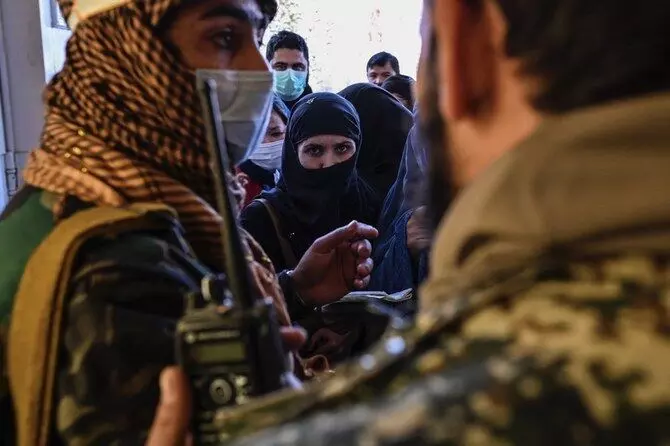
Taliban actions, media stereotypes of Women condemned by Islamic world officials
text_fieldsNew York City: The Organization of Islamic Cooperation on Wednesday reaffirmed that women's rights are equivalent to Islamic rights and urged the Taliban to honour their commitments to respect women's rights by revoking their prohibition on women attending secondary and higher education.
Officials and leaders of international groups urged Western media outlets to address negative stereotypes in their coverage of Muslim women while speaking at the UN headquarters in New York during a daylong "Women in Islam" conference commemorating International Women's Day. Meanwhile, an Emirati official made a clear link between Islamophobia and religious extremism, Arab News reported.
“The common thread in everyone’s message today covered the unfortunate situation in Afghanistan, and everyone expressed their displeasure and disappointment that women in Afghanistan have not only been deprived of their rights but the interim government has not yet lived up to its promises to allow access to education,” Pakistani Foreign Minister Bilawal Bhutto Zardari, whose country currently holds the rotating chair of the OIC, said.
The Taliban's use of Islam as justification for how they treat women is particularly disappointing, he continued.
“All countries within the Organization of Islamic Cooperation are unanimous that this has nothing to with Islam, that this is alien to the concept of Islam, and the first word of the Holy Qur’an is ‘Read,’ and we continue to press the interim government to in Afghanistan to live up to their promises and grant women their right to education,” Bhutto Zardari said.
Marwan Ali Noman Aldobhany, the Yemeni deputy permanent representative to the UN, compared the Taliban's behaviour to that of the Houthi militia in Yemen, which is supported by Iran, saying that both organisations deprive women of their political, economic, and social rights.
He claimed that there are significant restrictions on the movement of women between cities and that gender segregation is prevalent in schools and all other institutions controlled by the Houthis.
“These militias abduct hundreds of Yemeni women, throw them in secret prisons, then frame them with crimes,” said Aldobhany. “They torture them and sexually attack and exploit them because of their political activity.”
He urged UN members to condemn these actions, saying they have "no connection to Islam."
Lord Ahmad of Wimbledon, the prime minister's special envoy for preventing sexual violence in conflict and the UK minister of state for the Middle East, North Africa, South Asia, and UN at the Foreign, Commonwealth, and Development Office, said at the conference that “societies prosper, nations progress when women are at the heart of progress.”
He lamented the “untold challenges” women and girls face around the world and described the economic cost of their exclusion from political, economic, educational and social spaces as “stark.”
“The cost to our global society is harder to measure but just as troubling, and should be a concern to us all in our work around the world,” he added.
Lord Ahmad urged all nations to unite in asking that the Taliban recognise the rights of women and to ask them, "What are you doing? This is not Islam,
Noaura Al-Kaabi, Emirati minister of state, claimed that many women and girls experience discrimination, have choices made for them, and are routinely excluded just because they are female. “This is not an issue that is particular to just one region, race or religion,” she said. “It is a global epidemic.”
Al-Kaabi claimed that misrepresentation, distortion, and misunderstanding of Islam worsen gender discrimination against Muslim women.
She went on to say that extremism and Islamophobia are two sides of the same coin.
“Extremism distorts Islam as a means of justifying discriminatory practices and misogynistic policies against women and girls,” Al-Kaabi said. “Islamophobia instrumentalizes the status of women and Islam in a cynical effort to vilify and ‘otherize’ Islam and Muslims.”
She criticised the Taliban for abusing the rights of Afghan women and girls, and she encouraged UN member states to oppose any initiatives that would legitimise the misrepresentation of Islam that serves as justification for widespread discrimination.
Islam holds men and women to be equal, pointed out May Jasem Mohammed Al-Baghly, Kuwait's minister of social affairs and community development and minister of state for women and children's affairs, and asked for action to combat stereotypes related to Muslim women. “We have created you from male and female and made you peoples and tribes that you may know one another,” she said, quoting the Qur’an.
The minister of social development for Jordan, Wafa Bani Mustafa, stated that her nation, which is home to the second-largest refugee community in the world, places a special emphasis on female refugees and “guaranteeing them a dignified life on the basis of the humanist messages of Islam and the moral values of all Jordanian people.”
According to Mustafa, Jordan has taken steps to strengthen its Shariah-based legislative framework, particularly with regard to civil affairs. He also noted that Jordanian women enjoy all necessary legal protections in marriage, divorce, and education.
Amal Hamad, the Palestinian minister for women's affairs, described the ways in which the Israeli occupation harms Palestinian women and emphasised the efforts made by the Palestinian government to combat gender-based discrimination, including the adoption of financial inclusion measures to ensure women can become financially independent.
According to Qatar's deputy foreign minister Lolwah Al-Khader, women are referred to in the Qur'an as "the twin halves of men."
She added that “the question of woman is one which should be answered beyond politics, (for) what we are witnessing today is the transformation of women’s issues from a legitimate concern to a contentious political topic.”
Al-Khader pointed out that the problems women face are essentially universal.
“On a daily basis, women have to deal with gender-based discrimination, gender-based violence, a gender-based glass ceiling and much more,” she said.
Muslim women's issues are made worse by the fact that they are "constantly politicized at every juncture," she continued.
“When we look at the world today, sadly, we notice the unchecked rise of Islamophobia as a phenomenon, and discourse culminating over the past few decades to embed itself in popular national narratives,” said Al-Khader.
“The effects of such escalations are felt acutely by Muslim women, (who) are more vulnerable to discrimination and hate crimes and often face a double penalty for being women, Muslim — and even worse, if they belong to ethnic minorities.”
Despite the efforts of Islamophobic campaigns, Mohammed Al-Hassan, Oman's permanent delegate to the UN, stated that the message of Islam continues to be an enduringly monotheistic message that upholds the dignity of all people, "whether men or women." He urged all nations to join forces to defend the rights of women, particularly Afghan women.
“The situation in Afghanistan is not representative of Islam or Muslims in general, and we reject any association between the situation in Afghanistan and the perception of Islam,” he said.
























